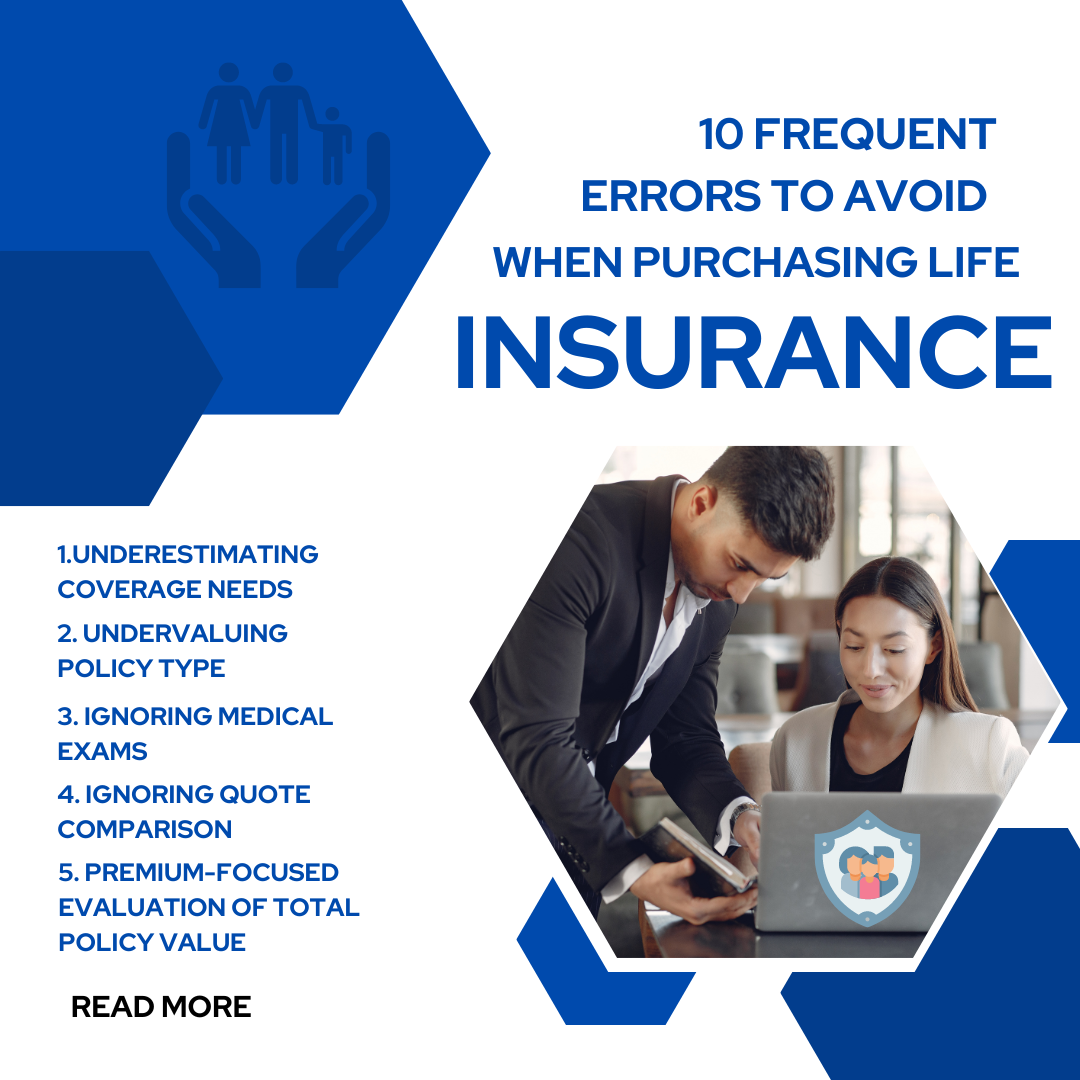Financial stability for your family after you die requires life insurance. The process is hard, and many people make mistakes that result in inadequate coverage or unnecessary expenditures. Learn about 10 life insurance purchasing blunders to make a good choice.
1. Underestimating Coverage Needs
Know Future Financial Obligations
One of the greatest life insurance mistakes is underestimating coverage. Life insurance should cover burial and long-term financial obligations. Mortgages, child education, dependent living expenses, and debts are examples. Your family should live well and meet their financial needs after your death.
Complete Needs Analysis
Avoid underestimating coverage needs by assessing financial responsibilities. Consider your family’s lifestyle and budget for children’s education. Mortgages, vehicle debts, and personal loans must be paid. Include projected healthcare and other costs.
A comprehensive checkup may seem tedious, but life insurance needs must be determined. Getting financial counsel may help. A financial expert can explain your circumstances and calculate the proper coverage for your family. This complete approach protects your family from underinsurance.
2. Undervaluing Policy Type
Life insurance: term vs. permanent
Another common error is misunderstanding life insurance policy kinds. Term and permanent life insurance dominate. The term life insurance lasts 10–30 years. This affordable and simple insurance is useful for covering certain financial obligations like a mortgage or children’s education within a defined time. If the policyholder requires insurance after the term ends, they must acquire a more expensive policy due to age or health issues.
Permanent life insurance invests in cash and protects forever. This method is more expensive but can build wealth. Permanent life insurance aids estate planning and preservation.
Right Policy Choice
Choosing the wrong policy might mean overpaying for unnecessary coverage or lacking protection. Choose according to your financial goals, budget, and coverage length. Due to its affordability, term life insurance may be right for you if you want to support your family while working. Permanent life insurance may provide longer coverage and financial benefits.
Consider your long-term financial requirements and policy options. Financial advisors offer individualized advice on cost and coverage.
3. Ignoring Medical Exams
Function of Medical Exams
Life insurance plans frequently need medical exams to determine health and risk. This assessment includes height, weight, blood pressure, blood tests, and sometimes an electrocardiogram. Insurers use this data to risk-classify applicants, affecting rates. Skipping this step may increase premiums or deny coverage. Insurers may charge higher rates or impose tougher policy restrictions without a medical exam.
Exam Preparation
Prepare adequately for the medical exam to avoid issues. Stay healthy before the exam. Healthy eating, exercise, and sleep boost health. A few days before the exam, avoid alcohol, tobacco, caffeine, and sweets, which can affect blood pressure and other readings.
Provide all relevant health information throughout the test. Be upfront about your medical history, medications, and pre-existing conditions. If information is erroneous or lacking, disparities may lead to claim denials.
4. Ignoring Quote Comparison
Avoiding quotations from many organizations might lead to life insurance overpayment. Company, underwriting, target market, and product offer affect rates and incentives. Costs and benefits vary greatly across life insurers. Without examining these options, you may acquire costly or insufficient coverage. Compare costs to find the greatest bargain and comprehensive coverage.
Online brokers and tools
Compare life insurance using online tools and brokers. Online tools enable you to rapidly compare rates from many insurers by inputting your basic information and policy options. Comparisons of coverage, pricing, and benefits might help them pick.
Insurance agents and internet tools can help you find the finest coverage. Brokers can recommend insurance packages from several companies based on your needs. They can explain rules, fine print, and the application process.
5. Premium-focused Evaluation of Total Policy Value
Life insurance with the lowest premium is enticing. Focusing on low premiums is dangerous. Low-cost insurance may have limited coverage, shorter durations, or higher deductibles. These limits may leave your family financially vulnerable after your death, defeating life insurance.
Complete Benefit Analysis
Consider a policy’s value, not just its price. This involves a thorough examination of several crucial factors:
Coverage amount
Coverage pays your beneficiaries in full upon death. This amount should cover your family’s expenditures, living costs, and future obligations like college tuition for your children.
Consider the policy duration. Term life insurance may last 10–30 years. Match the length to your financial obligations and dependents’ vulnerable time. Get lifelong permanent life insurance that suits your financial goals.
Exclusions
Carefully review policy exclusions. In certain circumstances, the insurer will not pay the death benefit. Leaving out suicide, danger, and conflict is widespread. Understanding these exclusions helps you choose a reliable policy.
Extra Benefits and Riders
Insurance advantages and riders are worth considering. Common riders:
The unintentional Death Benefit increases payments for unintentional fatalities.
Your premiums are waived if you become disabled and cannot work.
Critical illness rider: Provides a portion of a death benefit for critical illness diagnosis.
Extras can increase the policy’s value and security.
Informed Choice
A greater premium may offer more protection and value given the complete features. Critical illness coverage and a waiver of premium rider may make higher-priced insurance better in the long run.
Compare premiums and benefits to decide rationally. Financial advisors and insurance brokers can compare policy values. This guarantees you get the lowest coverage and financial protection for your family.
6. Ignoring Policy Riders
Understanding Policy Enhancements
Riders provide advantages and options to life insurance plans. Customizing riders improves insurance coverage and meets needs. Common riders:
Critical illness coverage
A lump sum is paid if the insured develops cancer, heart attack, or stroke. The dividend might cover medical expenditures and other illness-related expenses during a tough period.
Waiver of Premium
This rider promises that the insurance company will waive premiums if the policyholder becomes disabled and unable to work. This maintains the insurance in place, safeguarding the insured and beneficiaries throughout financial hardship.
Accidental Death Benefit
This rider pays more if an accident kills the insured. The beneficiaries receive additional funds beyond the death benefit for unexpected expenses or income loss.
Coverage Customisation
Avoiding these riders might cost you crucial coverage. Your condition and needs are unique, so consider adding riders to better your insurance.
Risk and vulnerability assessment. Critical sickness coverage may protect you if your family has certain diseases. If you work in a risky sector, an accidental death benefit rider may help.
7. Ignoring Policy Review and Update
Regular Policy Review
Life insurance requires effort. Life alters insurance needs. Failure to review and renew your life insurance policy may result in inadequate coverage or excessive costs. Monthly insurance reviews update your coverage to your finances and life stage.
Life Change Adjustment
Life insurance should be reviewed after marriage, childbirth, and income changes. These disasters can drastically impact your finances, so alter your coverage.
Your spouse’s financial dependence on you may need you to increase your coverage after marriage. Due to childcare and school costs, having a child changes your coverage needs.
Once your kids are financially independent, you may need less insurance. Changes to your policy may reduce unnecessary coverage and insurance costs.
Importance of Regular Reviews
Periodic policy reviews might also benefit you from insurance market or health changes. You may get lower rates or more coverage if your lifestyle changes enhance your health.
Insurance should be reviewed annually or after a big life event. Throughout the evaluation, check your coverage, insurance term, beneficiaries, and riders or supplementary benefits. Check with a financial advisor or insurance provider to ensure your coverage fulfills your needs and protects your family.
8. Misnaming the Beneficiary
Correct Beneficiary Designation Matters
Life insurance planning needs beneficiary selection. The beneficiary receives the death benefit when the insured dies. Not identifying or changing the beneficiary might lead to legal complications and unexpected benefits.
Possible Misdesignation Effects
Uncertain, outdated, or erroneous beneficiary designations might delay benefit distribution or trigger beneficiary disputes. In exceptional cases, default laws may grant benefits against the insured’s wishes.
Maintain current beneficiary information to avoid complications. Name the correct beneficiaries when you start coverage. After important life events like marriage, divorce, delivery, or beneficiary death, check this information regularly.
Regularly Review Beneficiary Designation
Life may change suddenly. You must verify and update your beneficiary designation. Failure to update this information may result in benefits going to an ex-spouse instead of your spouse or children.
Seek Legal and Financial Advice
Make sure your beneficiary list matches your goals by consulting legal and financial professionals. They can clarify beneficiary designations and help with family difficulties.
9. Not comprehending policy exclusions
Knowing Non-Coverage
Your life insurance policy’s exclusions are as important as its benefits. Beneficiaries may not get the death benefit under certain situations. An insurance company and policy type may exclude suicide within a certain duration, war, or death from extreme sports or illegal conduct.
Understanding Details
Understand your life insurance policy’s exclusions to avoid surprises and provide enough coverage when you need it most. Read your insurance’s small fine print to see what might terminate your coverage.
Clarity Matters
Discuss exclusions and your situation with your insurance agent. They may define policy constraints and assure understanding.
Concerns about coverage
Think about how life insurance exclusions fit your activities and lifestyle. Skydiving and rock climbing are excluded, therefore you may need supplemental coverage or a tailored insurer.
10. Dishonesty Misrepresentation Impact
Life insurance applications need honesty. Improper representation might compromise your insurance and dependents’ money.
Policy Denial—No Coverage
Not providing correct or complete information throughout the application process may have negative effects. If you lie, your insurer may deny coverage. Your insurance may be voided if you falsify throughout the claims process.
Financial Loss and Lawsuit
Misrepresentation has consequences beyond policy denial or coverage voiding. Deception may wipe off your beneficiaries’ death benefit, leaving them financially vulnerable. Insurance companies can recoup benefits if deceit is discovered, causing significant financial harm to your family.
Full Disclosure
Avoid misrepresentation by providing complete and accurate application information. Health, lifestyle, work, and high-risk behaviors are covered. Though it may affect insurance rates or coverage, you must be honest.
Transparency Matters
Insurance companies assess risk using application data. Withholding or lying affects underwriting and risk assessment. Full disclosure ensures insurance validity and recipient financial stability.
Conclusion
Family financial security requires life insurance. Avoid these common blunders to save time, money, and sorrow. By understanding your coverage needs, choosing the right policy type, comparing prices, and updating your policy, you can provide your family peace of mind and financial security.

